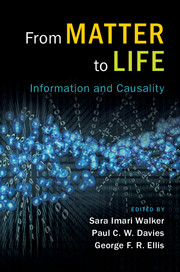Book contents
- Frontmatter
- Contents
- About the authors
- 1 Introduction
- Part I Physics and Life
- Part II Bio from Bit
- Part III Life's Hidden Information
- 8 Cryptographic Nature
- 9 Noise and Function
- 10 The Many Faces of State Space Compression
- 11 Causality, Information, and Biological Computation: An Algorithmic Software Approach to Life, Disease, and the Immune System
- Part IV Complexity and Causality
- Part V From Matter to Mind
- Index
8 - Cryptographic Nature
from Part III - Life's Hidden Information
Published online by Cambridge University Press: 02 March 2017
- Frontmatter
- Contents
- About the authors
- 1 Introduction
- Part I Physics and Life
- Part II Bio from Bit
- Part III Life's Hidden Information
- 8 Cryptographic Nature
- 9 Noise and Function
- 10 The Many Faces of State Space Compression
- 11 Causality, Information, and Biological Computation: An Algorithmic Software Approach to Life, Disease, and the Immune System
- Part IV Complexity and Causality
- Part V From Matter to Mind
- Index
Summary
Nature loves to hide.
– HeraclitusSECRET LIFE
The principle of energy conservation underpins much of physics and chemistry, to include mechanics, thermodynamics, and relativity (Mach, 1910). By contrast, the idea of statistical information provides a common language for genetics, development, and behavior, where information encodes “coordinates” for free energy landscapes – memory required by search strategies directed at appropriating metabolic resources (Krakauer, 2011). This memory is often encoded in genetic sequences that express enzymes, signaling molecules, and receptors, all of which can orient toward or process metabolic free energy. Whereas our understanding of energy can be reduced ultimately to symmetry principles (Brading and Castellani, 2003), information is derived from its antithesis, symmetry breaking (Gell-Mann, 1995). Stored information records which of several alternative adaptive configurations have been selected historically.
Adaptive matter requires metabolic energy for biological work – growth, reproduction, and repair. These requirements extend upward to populations, ecosystems, and even cities. The patchy distribution of free energy in space and time, combined with the fact that energy is transformed and thermalized when metabolized, requires efficient and accurate procedures for energy seeking. This scarcity problem is the reason why life can be thought of as a suite of evolved inferential mechanisms dependent on both memory storage – information – and “computation” for adaptive search.
Evolution by natural selection – a population-based search mechanics – produces outcomes in which information is restricted and concentrated ensuring that energy is distributed nonuniformly and anticompetitively: sequestered within cells, bodies, and communities, where it can be preferentially utilized and monopolized (Krakauer et al., 2009).
Organizations – cells, organisms, and populations – with accurate information about the whereabouts of metabolic energy sources endeavor to keep this information to themselves and share informative signals only with those with whom they have found a means to cooperate. These preferred signals include those generating the immunogenic self versus nonself, mating types, restriction systems, species isolating mechanisms, and, in some cases, languages.
The best way to restrict the flow of information is to protect it or to encrypt it (Shannon, 1949). This is the subject of this chapter: the many ways in which evolved information flows are restricted and metabolic resources protected and hidden, the thesis of living phenomena as evolutionary cryptosystems.
- Type
- Chapter
- Information
- From Matter to LifeInformation and Causality, pp. 157 - 173Publisher: Cambridge University PressPrint publication year: 2017
- 4
- Cited by



